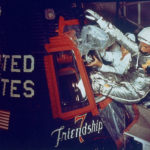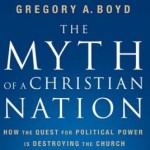We run our website the way we wished the whole internet worked: we provide high quality original content with no ads. We are funded solely by your direct support. Please consider supporting this project.

Listen and Learn: A First Step Toward Reconciliation
Jesus Christ is not just the Lord, Savior and Messiah of the Jews: he is the Lord, Savior and Messiah of all people. Through Christ a kingdom is being established that tears down tribal walls between races and re-unites and reconciles people together in the love God.
Paul makes the point most forcefully. In Ephesians Paul writes that the Gentiles who were once outside the covenant of God “have been brought near by the blood of Christ.” He then continues,
For he himself is our peace, who has made the two [Jew and Gentile] one and has destroyed the barrier, the dividing wall of hostility…His purpose was to create in himself one new humanity out of the two, thus making peace, and in one body to reconcile both of them to God through the cross, by which he put to death their hostility (Eph 2:14-16).
This is a breathtaking teaching! The most fundamental ethnic divide in the ancient world, at least from a Jewish perspective, was the divide between Jews and Gentiles. But by his work on the cross, Paul is saying, Jesus has destroyed the “dividing wall of hostility” between these two groups—and by extension, all other hostile groups. Not only has Jesus brought peace to all previously hostile groups; he himself is the peace between all groups. For through his death Jesus has created “one new humanity.”
A key step in manifesting the “one new humanity” is for those in power to humbly acknowledge that they don’t know what they don’t know. In other words, the only way that whites can understand the systemic racism in our culture is to listen and learn from those who experience it. The only way that people like me can possibly learn about the privilege I experience as opposed to the lack of privilege that people of color experience is to actually listen to them.
So, for example, rather than normalizing our own (privileged) experience and thus denying that racial profiling exists—accusing all who claim otherwise of “playing the race card”—we who are white must humbly listen to and trust the experience of nonwhites whose experience suggest that it does.
We who are white need to cultivate relationships with nonwhites that are deep enough to allow us to “get on the inside” of a nonwhite experience of the world. Not only this, but where it is appropriate, we who are white need to submit to the leadership of nonwhites. Individuals, small groups, and predominately white churches must pursue these submitted relationships if we’re to make headway in manifesting “the one new humanity.”
This is frankly quite challenging for many whites, even for those who sincerely believe they want to be agents of reconciliation. Our privileged status has conditioned us to assume our perspectives are normative and to expect to have things our way. Because America was established by and for whites, nonwhites have to deal with our culture, but we don’t usually have to deal with theirs. The decision to listen, learn, and follow people of color requires whites to place themselves in a submitted position they aren’t accustomed to. But if the systematic racism that has characterized the American church throughout its history is going to be subverted, this is the first step that must be taken.
—Adapted from The Myth of a Christian Religion, pages 113-121
Photo credit: runran via Visualhunt.com / CC BY-SA
Category: General
Tags: Humility, Listening, Love, Racial Reconciliation
Topics: Ethical, Cultural and Political Issues
Related Reading

Loving Enemies in the Day of ISIS
The following excerpt from Myth of a Christian Religion discusses Jesus’ command to “turn the other cheek.” Whatever our response to the persecution of Christians in the world, we must take this passage seriously. While this excerpt does not tell us exactly how to respond, it can be used to shape our attitude and stance…

Love Conquers All
Paul prayed in this way for the church at Ephesus: I pray that, according to the riches of his glory, [God] may grant that you may be strengthened in your inner being with power through his Spirit, and that Christ may dwell in your hearts through faith, as you are being rooted and grounded in…

The Holy Spirit Behind the Scenes
In John 17 we read Jesus’ prayer to be one with each another in Christ. Jesus prayed that his disciples … may be one. As you, Father are in me and I am in you, may they also be in us. … I in them and you in me, that they may become completely one,…

Friday Lights: Refuge
Each Friday we post content sent to us by our readers that is inspiring, funny, lighthearted or just generally fun. If you’d like more information on submitting content for this feature you can get more information here. Jean Rath sent us the video above, along with an article that chronicles how this family escaped war and terror…

Thinking Biblically?
Olga Caprotti via Compfight Micah J. Murray over at Redemption Pictures posted this reflection called Beware of Thinking Biblically. The image of a google search on the topic is worth the price of admission. Christians throw around this phrase in some really damaging ways, as Rachel Held Evans demonstrated in her recent publication of A Year…

Quotes to Chew on: Racial Reconciliation
Jesus perfectly embodied God’s heart for racial reconciliation. For example, most Jews of Jesus’ day despised Samaritans as racially impure and as heretics. They avoided physical or social contact with them if at all possible. Yet Jesus went out of his way to have contact with them, even touching some who were lepers. Moreover, he…
